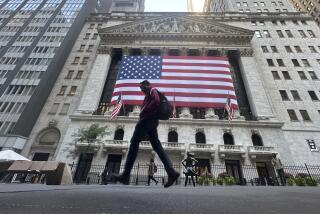Citigroup and BofA Top Profit Forecasts
- Share via
Bank of America Corp. and Citigroup Inc. beat analysts’ estimates for first-quarter earnings Monday, as robust results from consumer lending offset weakness in other business lines.
The strength of the banking giants’ results helped boost optimism about the economy and buoyed Wall Street, where the Dow Jones industrial average jumped 147.69 points, or 1.8%, to 8,351.10.
Powered by its Los Angeles-based consumer banking unit, BofA earned $2.4 billion, or $1.59 a share, in the quarter, up 11% from $2.18 billion, or $1.38 a share, a year earlier.
Analysts surveyed by earnings tracker Thomson First Call had expected $1.48 a share from BofA, the nation’s third-largest bank by assets.
Citigroup, the largest U.S. banking concern by assets, earned $4.1 billion, or 79 cents a share, beating the average estimate of analysts by 2 cents.
Both companies benefited from consumers’ continued willingness to borrow, even in the face of a struggling economy.
Charlotte, N.C.-based BofA said mortgage banking income soared to $405 million in the quarter, up 108% from a year earlier, while credit card income was up 18% at $681 million.
Citigroup’s total quarterly revenue of $18.5 billion was up 4% from a year earlier. But revenue from credit cards rose 7%, and the bank recorded a 15% jump in revenue from retail banking, thanks in part to last year’s buyout of California Federal Bank’s parent, Golden State Bancorp Inc.
Citigroup Chief Executive Sanford I. Weill said the acquisition was proceeding smoothly and was expected to be a “meaningful contributor” to his bank’s expanding retail business. New York-based Citigroup bought San Francisco-based Golden State last year for $5.8 billion.
While Citigroup’s retail banking profit jumped 54% from a year earlier to $942 million, profit from its capital markets and corporate banking unit was up a much more modest 10% to $1.23 billion.
BofA, by tightening credit to large customers, whittled its corporate loans by 7%, said Chief Financial Officer James Hance. The amount of large corporate loans that were delinquent or in default fell for the first time in six quarters.
Hance said the bank’s collection of large corporate loans suffered from “lumpiness” -- meaning problems remain in such battered sectors as telecommunications and airlines.
But BofA said it was strengthening its No. 1 position in Small Business Administration loans. Of 869 SBA loans made by 78 lenders in Los Angeles during the first quarter, BofA made 294, spokesman Ken Preston said. Last year the bank made 693 SBA loans for the full year in Los Angeles County.
BofA’s total revenue grew 4% from the previous year, to $8.89 billion in the quarter, but was short of the $9.05 billion analysts had expected.
Deposits, which have provided banks with a cheap source of funds as interest rates fell and investors pulled out of stocks, continued to rise at an annualized pace of 9.6%, BofA said.
Calling BofA’s quarter “very strong,” Sandler O’Neill & Partners analyst John Kline raised his annual earnings estimates by 20 cents a share for 2003 and 2004 to $6.40 and $7.15, respectively.
The stock rose 66 cents to $72 on the New York Stock Exchange, the highest closing price since mid-January.
Citigroup’s quarterly profit was down 15% from $4.8 billion, or 93 cents a share, in the first quarter of 2002. But the year-earlier results included a $1 billion after-tax profit from the bank’s spinoff of Travelers Property Casualty Corp.
Excluding that gain, Citigroup’s earnings were up 18% from a year earlier.
Its shares jumped $1.08 to $38.43 on the NYSE.
Citigroup set aside less money for bad loans in the quarter, making a provision of $235 million for losses in its global corporate and investment bank, down from $611 million during the first quarter of 2002, when it was battered by lending to Argentina and telecom firms.
BofA wrote off $833 million in bad loans, down from $840 million in the first quarter of 2002, and set aside $833 million for additional loan losses.
More to Read
Inside the business of entertainment
The Wide Shot brings you news, analysis and insights on everything from streaming wars to production — and what it all means for the future.
You may occasionally receive promotional content from the Los Angeles Times.











